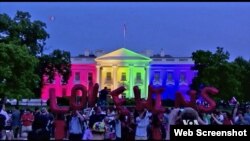On June 26, 2015, hundreds of gay rights supporters erupted in jubilation outside the Supreme Court when they learned of a 5-4 decision affirming the right to civil marriage for same-sex couples nationwide.
“Such a great day for me and my wife,” said a teary-eyed Lena Hernandez. “We are no longer second-class citizens.”
“I’m straight, so this doesn’t affect me technically,” said Alec. “But I’m so happy for everybody here.”
'Victory for America'
At the White House, President Barack Obama said, "This ruling is a victory for America.This decision affirms what millions of Americans already believe in their hearts: When all Americans are treated as equal we are all more free."
Having won a victory few imagined possible just a decade ago, activists are refocusing on issues surrounding employment, housing, and public accommodation.
“While the victory was huge, the battle is certainly not over,” said Jay Brown of the Washington-based Human Rights Campaign.
Thirty-one U.S. states have no laws explicitly protecting gays, lesbians, bisexuals, or transgender people from discrimination in the workplace and other areas of daily life.
“What that means is, a couple can get married on a Saturday, then go back to work on Monday and realize that they have been fired from their job, lost their home,” said Brown.
Culture wars
Religious conservatives, for their part, reject any suggestion that they are fighting a losing battle in what has been called America’s “culture wars.”
“We’re not beating a dead horse,” said Mat Staver of the Florida-based Liberty Counsel. “There’s no question that the battle is not over with regard to homosexuality, gay rights, marriage as the union of a man and a woman.”
“We actively oppose any inclusion into a non-discrimination code something that should never be there, and that is gender identity or sexual orientation,” he added.
After the Supreme Court ruling, Liberty Counsel defended Kentucky county clerk Kim Davis, who was briefly jailed for refusing to grant marriage licenses to same-sex couples in defiance of court orders.
In an exchange that drew national attention, Davis was asked under whose authority she was declining to issue marriage licenses.
“Under God’s authority,” Davis said to David Moore, who had applied for a license to wed his partner of 17 years.
Davis never relented, but under court order has not barred other clerks in her office from issuing same-sex marriage licenses, effectively defusing the situation.
Staver said Kim Davis’ experience shows, the more gay rights expand, the more religious liberty and freedom of conscience are eroded.
“This is not an issue that will simply go away,” he said. “The more people realize how coercive this is to people of faith and values and ordinary citizens, the more people push back.”
Brown sees an opposite trend: a public increasingly supportive of sexual minorities.
“Time has changed folks’ minds,” he said.“Once they see lesbian, gay, bisexual, transgender people as their coworkers, their sons, their daughters, people do come around.And I think public opinion will continue to change.”
Clear signal
“This country is pretty good about protecting religious freedom and religious expression,” said attorney Theodore Olson, who fought California’s ban on same-sex marriage.
On the question of battles to come, Olson said the Supreme Court’s ruling on marriage sent a clear signal to lower courts that may consider future cases involving gay rights.
“The Supreme Court said in very passionate language that gay and lesbian individuals are entitled to equal dignity under the law,” he said. “Their self-respect, their self-identity – who they are – you can’t take them and put them in some box and say, ‘They’re not entitled to this right’ or they should be treated differently in various walks of life.Their identity, their privacy, their freedom of association has to be respected.”
In his majority opinion in June, Supreme Court Justice Anthony Kennedy wrote, “No union is more profound than marriage ... In forming a marital union, two people become something greater than once they were.”
Referring to same-sex couples seeking the right to wed, Kennedy wrote, “Their hope is not to be condemned to live in loneliness, excluded from one of civilization’s oldest institutions.They ask for equal dignity in the eyes of the law.The Constitution grants them that right.”
In a dissent, Chief Justice John Roberts wrote, “Many people will rejoice at this decision, and I begrudge none their celebration.But for those who believe in a government of laws, not of men, the majority’s approach is deeply disheartening.”
“If you are among the many Americans — of whatever sexual orientation — who favor expanding same-sex marriage, by all means celebrate today’s decision,” Roberts added. “But do not celebrate the Constitution.It had nothing to do with it.”
With same-sex marriage settled as a matter of U.S. law, the 2016 elections could be the first in decades in which the issue is not a major point of contention between the two political parties.Some Republican presidential contenders continue to highlight their opposition to same-sex marriage as they seek their party’s nomination, but political observers expect the issue to fade once primary contests end and general election campaigns begin.








